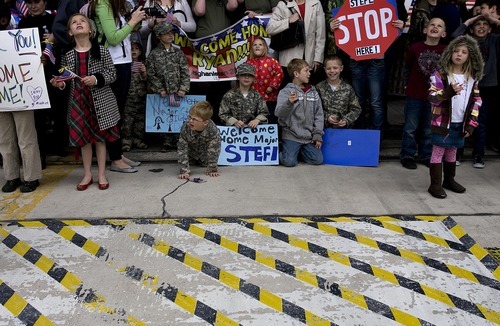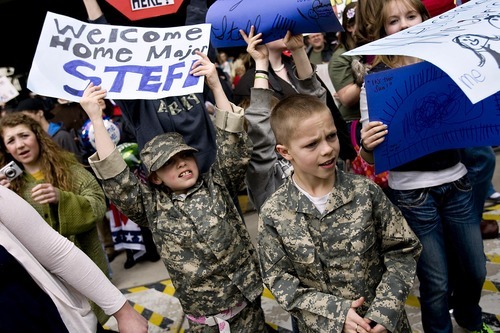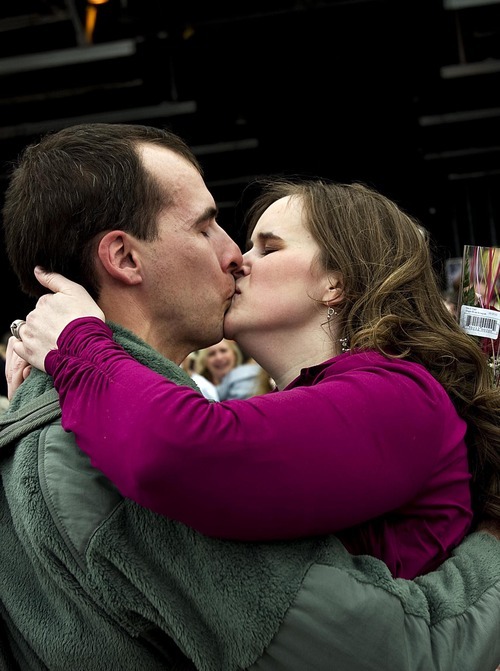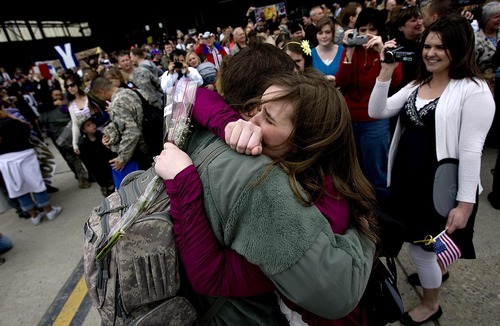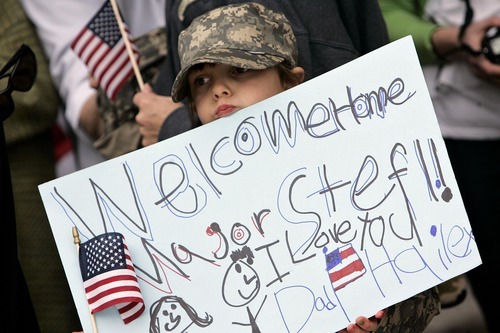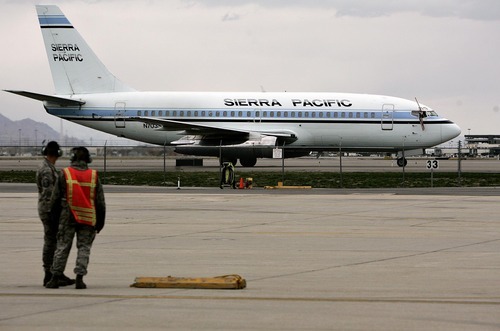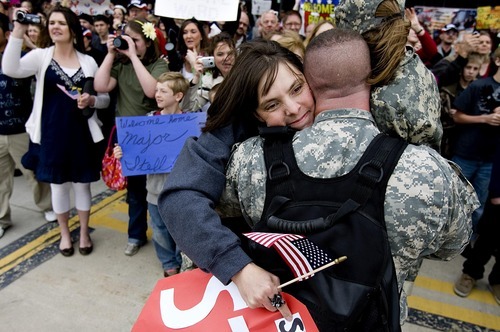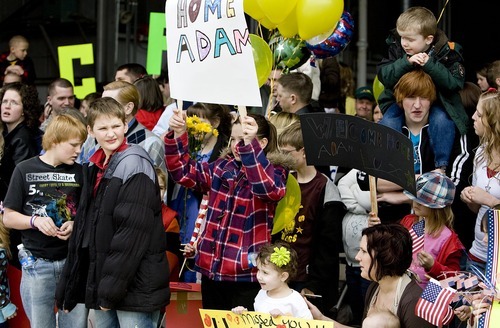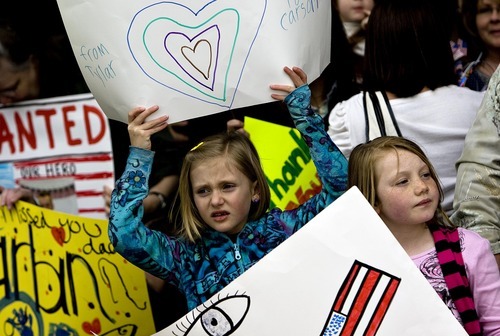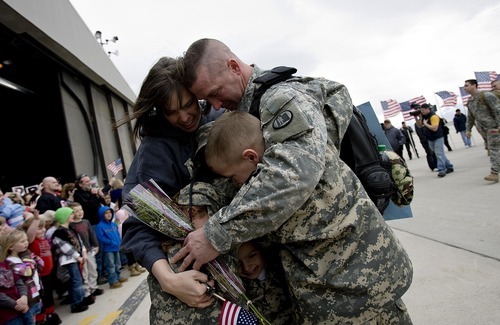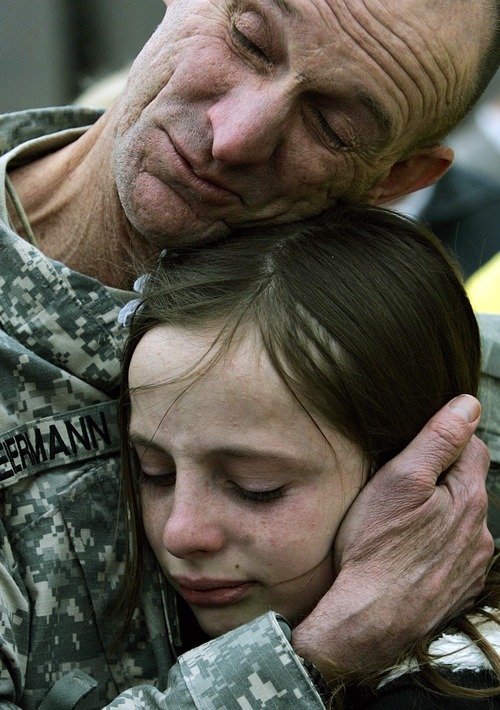This is an archived article that was published on sltrib.com in 2011, and information in the article may be outdated. It is provided only for personal research purposes and may not be reprinted.
They tried to communicate every night. But there were times when Tyler Hill would tell his wife that he wouldn't be able to call for a few days.
They didn't discuss the details, but Ellen Hill knew what that meant. Her 30-year-old husband, the father of her four children, would be rolling with an ambulance crew "outside the wire" and the semblances of protection he had on base would be gone.
"Just knowing what is out there, it was very scary," Ellen Hill said Sunday, minutes after her husband returned from a year-long deployment to Afghanistan with the Utah-based 144th Area Support Medical Company.
Against a biting wind at the Utah Air National Guard Base in Salt Lake City, hundreds of friends, family members and supporters gathered to welcome home the 75-member company, which treated military members, contractors and civilians in a hospital clinic at Forward Operating Base Salerno in southeastern Afghanistan and also provided ambulance support in one of the most hostile areas of the war-torn nation.
Hill, the noncommissioned officer in charge of medical evacuations, would often lead missions to provide medical care to soldiers at smaller outlying bases.
And back home, Ellen Hill would try to find ways to distract herself.
During the daytime it was easy. She would ready her three oldest for school and then set to work on the preschool curriculum for her youngest, 5-year-old Kelsey. Afternoons with the others — 12-year-old Gavin, 9-year-old Carter and 7-year-old Hailey — were a whirlwind of events and activities. Then it was dinner. Then it was time for bed.
"And then," she said, "it was the evening and the kids would all be in bed and it would be lonely. There wasn't a lot of adult interaction."
She found support in other military spouses. Not all of them had four children to look after, but they all shared her worry. And they understood her loneliness.
Mitchell and Cozette Vreeland had been through a deployment before. But that was before little Braxton came along.
"The hardest part was getting used to being a single mother," Vreeland said as her husband cooed at the son he left just two months after the tiny boy's birth.
Amid the echoes of hundreds of raucous reunions inside a cavernous aircraft hangar, the music of an Army band and the sound of nearby jets taking off at Salt Lake City International Airport, the 1-year-old boy sucked on the end of a chocolate-chip cookie as he bounced gently in his father's arms. It was a much smoother reunion than when Mitchell Vreeland came home for two weeks on leave, midway through his tour of duty.
"It really took him a long time to get used to me that time," the soldier said sadly.
Against the back of the hangar, Rep. Jason Chaffetz leaned against a table and watched the joyful gathering. If the freshman congressman had his way, there would be a lot more events like this in the very near future.
Just days after making an emotional plea to withdraw the military from Afghanistan — a plea unheeded, with Chaffetz being one of only eight Republicans and 93 House members to back a resolution asking President Barack Obama to bring U.S. troops home from that theater — Chaffetz stood in line to shake the hands of the 144th soldiers as they disembarked from a charter jet and then stood by to meet with family members and guard leaders on hand for the unit's return.
Chaffetz said he does not believe that enemy elements in Afghanistan pose a "clear and present danger" to the United States — a standard he says has also not been met in Libya, where American forces are supporting attacks against Moammar Gadhafi's forces.
American military resources should be expended fighting threats wherever they materialize, Chaffetz said, "not supporting governments that we know are corrupt."
"These soldiers had a very difficult, very tough and very dangerous mission," Chaffetz said.
And, he said, it's time for their fellow warriors — and the families that sacrifice alongside them — to get a break.


